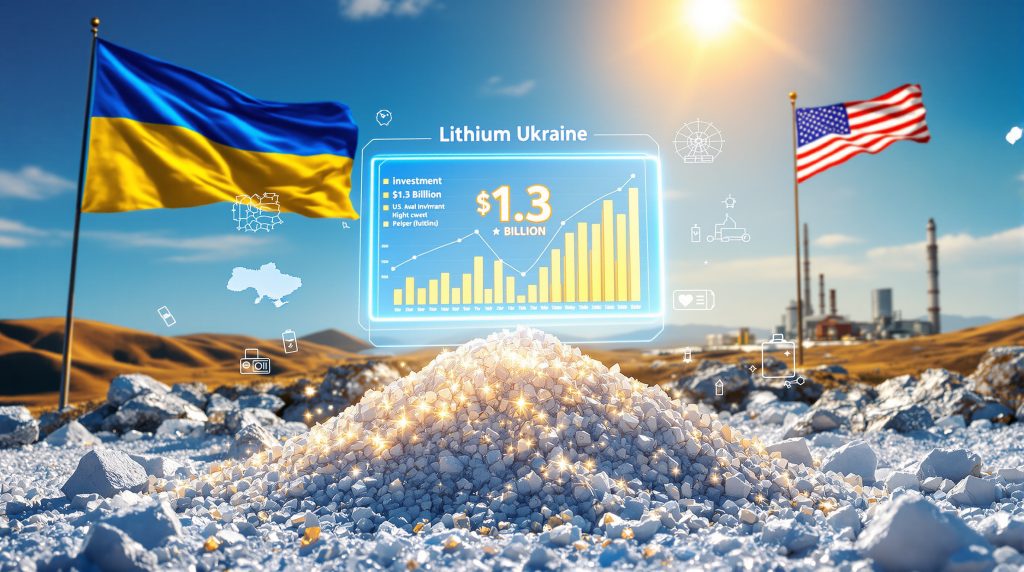TechMet's Strategic Investment Philosophy in Critical Minerals
TechMet operates as a highly specialized investment vehicle targeting critical mineral assets across emerging markets, with a portfolio currently valued at approximately $1.3 billion. The Dublin-registered firm maintains strategic backing from the US International Development Finance Corporation, positioning it uniquely for geopolitically sensitive mineral acquisitions during turbulent market periods. Furthermore, the company's involvement in the TechMet in Ukraine lithium bid represents a significant strategic expansion into Eastern European resources.
The company's investment philosophy centers on capitalising on market timing during periods of supply weakness. Chief Executive Brian Menell emphasises that current market conditions represent an exceptionally favourable environment for capital deployment, particularly given the oversupply situation affecting lithium, nickel, cobalt, and rare earth sectors throughout 2024-2025.
This countercyclical approach allows TechMet to acquire quality assets at reduced valuations while competitors face capital constraints. The strategy requires substantial financial backing and patient capital, characteristics that distinguish institutional investors from opportunistic market participants. In addition, this approach aligns with broader global lithium trends affecting international markets.
Portfolio Structure and Geographic Diversification
TechMet maintains stakes in 10 companies spanning multiple continents, creating diversified exposure across the critical minerals value chain. The portfolio includes Brazilian Nickel operations in South America and Rainbow Rare Earths projects in South Africa, demonstrating the firm's commitment to resource-rich emerging markets.
| Asset Category | Current Holdings | Strategic Purpose | Market Position |
|---|---|---|---|
| Lithium Projects | Under evaluation (Ukraine) | Battery supply chain security | Early-stage development |
| Rare Earth Operations | Rainbow Rare Earths (Africa) | Technology sector supply | Production phase |
| Nickel Assets | Brazilian Nickel | Electric vehicle batteries | Operational |
| Total Portfolio Companies | 10 active investments | Critical mineral diversification | Multi-continental presence |
The relatively modest $1.3 billion valuation creates both opportunities and constraints for expansion. Large capital raises risk diluting existing investor positions, requiring TechMet to maintain highly selective and strategic approaches to new acquisitions rather than pursuing aggressive growth strategies.
Consequently, this selective approach has proven beneficial in maintaining portfolio quality. The company's focus on lithium industry innovations has positioned it well for future market opportunities.
Ukraine's Dobra Lithium Deposit and Global Supply Chain Integration
Ukraine controls an estimated one-third of Europe's total lithium reserves, representing approximately 3% of global lithium resources. This positions the country as a potentially significant supplier for European battery manufacturing, particularly as the continent seeks supply chain independence from Chinese processing dominance.
The Dobra deposit, located in central Ukraine's Kirovohrad region, represents one of Europe's most substantial undeveloped lithium assets. The tender process launched in April 2025 requires winning bidders to commit a minimum $179 million investment covering comprehensive development including exploration, production, and mineral processing capabilities.
This 50-year development agreement emerges from broader US-Ukraine reconstruction partnerships, offering American companies preferential access while requiring local profit reinvestment. The structure reflects strategic alignment between commercial mineral development and geopolitical objectives of strengthening Ukraine's Western integration. Moreover, this development supports energy security in minerals across Western supply chains.
Development Timeline and Selection Process
Q2 2025: Official tender launch with international bidding participation
Q3-Q4 2025: Comprehensive technical and financial evaluation of submitted proposals
Q1-Q2 2026: Final bidder selection and formal agreement finalisation
2026-2030: Initial development phase with production capacity ramp-up
The Dobra tender represents a flagship reconstruction initiative within the US-Ukraine joint investment fund framework, combining commercial viability with strategic supply chain diversification objectives.
The selection process emphasises operational experience, technical capacity, and financial resources rather than purely economic bidding. TechMet's combination of government backing, operational expertise through portfolio companies, and proven capital deployment capabilities positions the firm competitively within this framework. However, the TechMet in Ukraine lithium bid faces significant competition from established mining companies.
Geopolitical Implications of Western Critical Mineral Investment
The American government's support for TechMet's Ukrainian operations reflects broader strategic competition with Chinese dominance in critical mineral processing. China currently controls over 60% of global lithium processing capacity, creating significant supply vulnerabilities for Western battery manufacturers and electric vehicle producers.
TechMet's backing by US government financial institutions provides competitive advantages in securing development rights, particularly given Ukraine's alignment with Western economic and security frameworks. This government partnership enables participation in strategic mineral initiatives that align with US national security interests. In fact, recent developments including the US critical minerals order have further emphasised these strategic priorities.
European Union's Critical Minerals Strategy Challenges
Despite implementing the Critical Raw Materials Act in 2024, European efforts to secure independent mineral supply chains face substantial bureaucratic and coordination challenges. TechMet leadership has expressed significant concerns about European institutional capacity to execute large-scale mineral development projects effectively.
Key European Implementation Challenges:
• Complex multi-national regulatory coordination across 27 member states
• Limited government financial backing compared to US initiatives
• Competing national interests within EU framework structures
• Slower decision-making processes for strategic investments
• Bureaucratic inefficiencies hindering project execution
The European approach emphasises regulatory frameworks and environmental standards but may lack sufficient financial backing and political coordination for large-scale project implementation. This creates competitive disadvantages compared to more decisive US government initiatives in critical mineral development. Nevertheless, Europe's raw materials supply initiatives continue to evolve.
Fundraising Strategy Supporting Portfolio Expansion
TechMet successfully raised $300 million in early 2025, including $180 million from Qatar Investment Authority, demonstrating strong institutional confidence in critical mineral investment opportunities. The company has reopened fundraising activities, targeting significantly higher capital levels with expected closure within 3-5 weeks.
The fundraising timing capitalises on current market weakness in critical minerals pricing. Supply oversupply conditions, driven by increased Australian and South American production, have reduced asset valuations across the lithium sector, creating enhanced opportunities for well-capitalised investors.
Investment Selection Criteria and Capital Deployment
| Evaluation Factor | Strategic Weight | Current Market Advantage |
|---|---|---|
| Resource Quality | Critical | Enhanced due diligence opportunities |
| Geopolitical Stability | Essential | Western-aligned jurisdictions preferred |
| Development Timeline | Moderate | Accelerated permitting in strategic regions |
| Supply Chain Integration | High | Battery manufacturer partnerships essential |
| Government Support | Critical | Regulatory backing reduces operational risks |
The firm's investment structure creates inherent constraints on aggressive expansion. Raising large sums would dilute current investors, requiring TechMet to maintain disciplined approaches to portfolio additions rather than opportunistic acquisition patterns.
Government Partnerships and Strategic Mineral Development
The International Development Finance Corporation's investment in TechMet provides more than capital—it offers diplomatic and regulatory support for international mineral development projects. This backing proves particularly valuable in post-conflict reconstruction scenarios like Ukraine.
Government partnership enables TechMet to participate in strategic mineral initiatives that align with US national security interests, creating competitive advantages in bidding processes and regulatory approvals. The relationship demonstrates how private investment vehicles can advance both commercial objectives and strategic national interests.
Ukraine Reconstruction Fund Integration
The US-Ukraine joint investment fund, established in April 2025, positions the Dobra lithium project as a flagship reconstruction initiative. This framework combines commercial mineral development with broader geopolitical objectives of strengthening Ukraine's Western integration.
Reconstruction Fund Strategic Benefits:
• Streamlined permitting and regulatory approval processes
• Enhanced security guarantees for foreign investment projects
• Coordinated infrastructure development support systems
• Long-term political risk mitigation mechanisms
• Priority access to development opportunities
The fund structure reflects lessons learned from post-2022 European energy diversification following Russian gas supply disruptions. However, mineral supply chain development requires longer-term commitments and more complex international coordination than energy partnerships.
Eastern European Lithium Resources Comparative Analysis
Ukraine's lithium reserves face unique challenges due to ongoing conflict, with significant resources located in Russian-occupied territories. However, accessible deposits like Dobra maintain strategic value for European supply chain diversification efforts.
The regional competition includes multiple projects at various development stages, each offering different advantages and facing distinct challenges. Understanding these comparative factors helps assess TechMet's strategic positioning within Eastern European critical mineral development.
Regional Project Comparison Framework
| Project | Country | Developer | Development Status | Key Strategic Advantages |
|---|---|---|---|---|
| Dobra | Ukraine | TechMet (bidding) | Tender evaluation phase | US government backing |
| Polokhivske | Ukraine | UkrLithium | Advanced permitting | EU market proximity |
| Jadar | Serbia | Rio Tinto | Environmental review | Established infrastructure |
| Regional Exploration | Poland | Various | Early assessment | NATO member security |
Ukraine's mineral potential extends beyond lithium to include rare earths, graphite, and other critical materials essential for technology and defence applications. Successful development could establish the country as a key European supplier, supporting both economic recovery and strategic Western supply chain objectives. Furthermore, the TechMet in Ukraine lithium bid represents broader Western strategic interests in the region.
Environmental and Social Considerations in Ukrainian Development
Modern lithium extraction projects increasingly emphasise environmental stewardship and community engagement to secure long-term operational licences. Ukrainian projects must balance rapid development timelines with responsible mining practices to maintain Western investor support and social licence to operate.
The Dobra project's development framework includes comprehensive environmental impact assessments and community consultation processes, reflecting international best practices for critical mineral extraction. These requirements add complexity and cost but ensure sustainable development aligned with European regulatory standards.
Post-Conflict Reconstruction Economic Impact
Lithium mining operations in Ukraine serve dual purposes: supplying global battery markets while providing economic opportunities for post-conflict reconstruction. Local employment generation and infrastructure development create positive community impacts beyond mineral extraction activities.
Community Development Considerations:
• Local employment opportunities in technical and support roles
• Infrastructure development benefiting broader regional economy
• Technology transfer and skills development programmes
• Revenue sharing arrangements with local communities
• Environmental restoration and land use planning
Successful lithium development could establish Ukraine as a key European critical mineral supplier, supporting both economic recovery and strategic Western supply chain objectives while demonstrating resilience in post-conflict reconstruction.
Critical Mineral Market Dynamics and Investment Timing
The global lithium market experienced significant price volatility throughout 2024-2025, creating acquisition opportunities for well-capitalised investors. Current supply oversupply conditions have reduced asset valuations across the sector, enabling strategic investors to acquire quality assets at favourable terms.
TechMet's strategy explicitly capitalises on this market weakness to acquire quality assets at favourable terms, positioning for long-term supply tightening as electric vehicle adoption accelerates globally. This countercyclical approach requires substantial capital reserves and patient investment horizons.
Battery Industry Demand Projections and Supply Security
Global lithium demand projections indicate potential supply shortfalls by 2028-2030, making current asset acquisition strategies particularly valuable for long-term portfolio performance. The demand surge reflects multiple converging trends across transportation, energy storage, and consumer electronics sectors.
Primary Demand Growth Drivers:
• Electric vehicle production scaling across major automotive markets globally
• Grid-scale energy storage deployment for renewable energy integration
• Consumer electronics continued expansion in emerging markets
• Industrial battery applications growth across multiple sectors
• Strategic mineral stockpiling by government and corporate entities
The supply-demand imbalance creates favourable conditions for projects like Dobra that can achieve production by the late 2020s, positioning investors to capture significant value appreciation as markets tighten.
European Critical Mineral Policy Implementation Challenges
The European Union's 2024 Critical Raw Materials Act aims to reduce dependency on Chinese mineral supply chains through domestic production and strategic partnerships. However, implementation faces significant coordination challenges across 27 member states with varying industrial priorities and regulatory frameworks.
European efforts to establish critical mineral partnerships with resource-rich countries mirror post-2022 energy diversification strategies. The approach emphasises multilateral cooperation and regulatory harmonisation but may lack the decisive execution capabilities demonstrated by US government initiatives.
Strategic Partnership Development Constraints
European critical mineral strategies emphasise comprehensive regulatory frameworks and stringent environmental standards but may lack sufficient financial backing and political coordination for large-scale project implementation. This creates potential competitive disadvantages compared to more streamlined US approaches.
EU Implementation Gap Analysis:
• Regulatory complexity across multiple jurisdictions
• Limited financial commitment relative to strategic objectives
• Coordination challenges among competing national interests
• Slower approval processes for international partnerships
• Risk-averse institutional culture limiting bold initiatives
European policy frameworks demonstrate strong commitment to critical mineral independence but require enhanced execution capabilities and financial resources to compete effectively with US and Chinese strategic initiatives.
Long-Term Strategic Implications of Ukrainian Investment
Successful development of Ukrainian lithium resources would significantly enhance Western battery supply chain resilience, reducing strategic dependence on Chinese mineral processing capabilities. This diversification supports broader energy transition objectives while strengthening geopolitical alignment between Ukraine and Western economies.
The Dobra project's success could catalyse additional Western investment in Ukrainian critical mineral assets, establishing the country as a key European resource supplier for the next decade. This would represent a fundamental shift in European supply chain architecture. In this context, the TechMet in Ukraine lithium bid serves as a critical test case for Western engagement.
Investment Portfolio Expansion and Market Positioning
TechMet's Ukrainian operations represent strategic expansion beyond traditional mining jurisdictions, demonstrating capability to execute complex projects in challenging geopolitical environments. Success in Ukraine could enhance the firm's reputation for managing political and operational risks in emerging market mineral development. Additionally, TechMet's portfolio expansion reflects growing confidence in Eastern European opportunities.
Future Strategic Expansion Opportunities:
• Additional Ukrainian mineral assets including rare earths and graphite
• Eastern European critical mineral partnership development
• Post-conflict reconstruction mineral projects in other regions
• Strategic battery supply chain integration investments
• Technology transfer and processing capability development
The Ukrainian investment represents a test case for Western private sector engagement in post-conflict reconstruction through strategic mineral development. Success could establish templates for similar initiatives in other regions facing geopolitical challenges while maintaining commercial viability.
Investment in emerging market critical mineral assets involves substantial risks including political, operational, and market volatility. Projections regarding future supply-demand dynamics and commodity pricing reflect current market analysis and may not accurately predict future performance. Potential investors should conduct thorough due diligence and consider professional investment advice before making investment decisions.
Ready to Capitalise on Critical Mineral Investment Opportunities?
Discovery Alert's proprietary Discovery IQ model delivers real-time alerts on significant ASX mineral discoveries, instantly empowering subscribers to identify actionable opportunities ahead of the broader market. Understand why major mineral discoveries can lead to substantial returns by exploring Discovery Alert's dedicated discoveries page, showcasing historic examples of exceptional outcomes, and begin your 30-day free trial today to position yourself ahead of the market.




